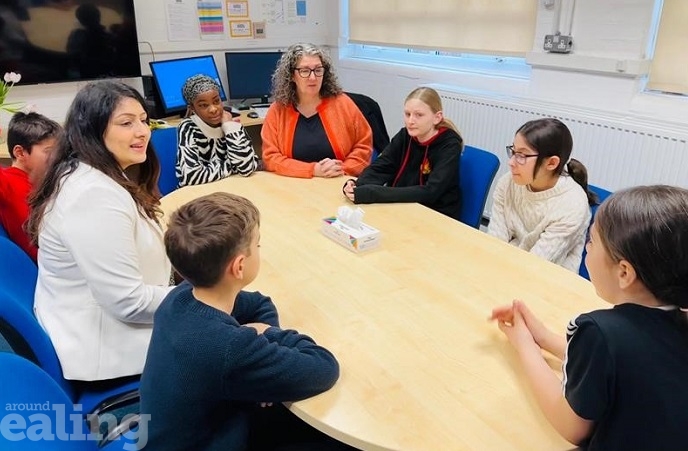“It is great to come to school because we have lots of great opportunities and the teachers make learning fun,” said Aleza, a year 5 pupil at Little Ealing Primary School in response to being asked if school attendance was important.
The efforts of pupils, parents and carers, staff and support from Ealing Council has meant that Little Ealing, in Weymouth Avenue, has a very good school attendance record. A record that is repeated across schools in the borough and recognised by the Department of Education (DfE) after a visit to review how the council is working together with schools and other partner agencies to support school attendance.
They found that overall excellent progress towards delivering against the new Working Together to Improve Attendance guidance has been made and that the Ealing Learning Partnership, a partnership between the council and schools, has been instrumental in achieving this.
‘Young people can have worries’
“Many children will experience normal but difficult emotions that might make them nervous about attending school,” said Councillor Nagpal, cabinet member for a fairer start who recently visited Little Ealing. “Young people can have worries about friendships, schoolwork, or examinations and the impact of the pandemic can and has amplified these worries.
“But it is important that children attend school regularly, and in many cases, attendance at school may help with the underlying issue as being away from school might exacerbate worries, and a prolonged period of absence may heighten anxious feelings about attending in future.”
The council’s attendance team and the attendance officers assigned to each school, work with families, schools and other agencies to help with direct advice and support around attendance issues, alongside published guidance.
There is a link between poor attendance at school and low levels of educational achievement, but children also miss out on the fun of being in school: friendships, games, social skills, expressing themselves through art and drama, and much more. And for the most vulnerable pupils, regular attendance is also an important protective factor and the best opportunity for needs to be identified and support provided.
Complex barriers
Some children face complex barriers to attendance. This can include pupils who have long term physical or mental health conditions or who have special educational needs and disabilities (SEND). Their right to an education is the same as any other pupil and therefore the attendance ambition for these pupils should be the same as it is for any other pupil, but additional support in school may be identified and need to be provided. Where the needs are wide and complex, a whole family response could be what’s needed, this is likely to include a voluntary early help assessment and plan (EHAP) so that a wider range of services can support.
“Good attendance is a learned behaviour, and therefore good patterns of attendance should be put in place from when a child first starts at school,” said Councillor Nagpal. “Regular attendance at school is essential for pupils to get the most out of their school experience, including their social and emotional wellbeing, overall development, attainment, and wider life chances.
“Promoting positive full attendance is everyone’s responsibility. It really does take a town to raise a child.”
And the final comment goes to Adunola, a year 6 pupil at Little Ealing: “I love being a part of this school because you get lots of opportunities and experiences. Overall school is fantastic and I would recommend it to other children.”
What can parents do to ensure good attendance?
- ensure their child attends every day
- notify school as soon as possible when their child must be unexpectedly absent (for example sickness) and keep the school updated if the absence is prolonged
- only request leave of absence in exceptional circumstances and do so in advance in writing.
- book any medical appointments around the school day where possible
- work with the school and the local authority to help them understand their child’s barriers to attendance
- proactively engage with the voluntary support offered to prevent the need for more formal support
- proactively engage with the formal support offered
For more information about school attendance, go to the council’s website.







